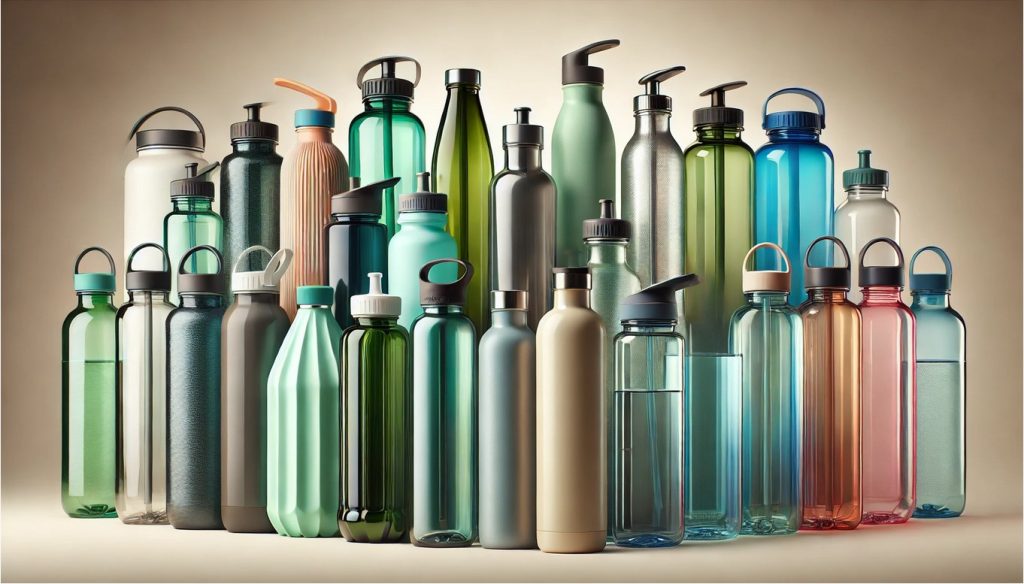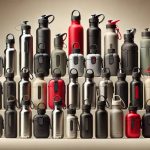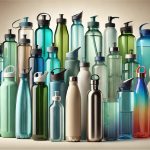In today’s world, environmental sustainability has become an essential part of daily life. From reducing waste to minimizing the consumption of single-use plastics, individuals are becoming increasingly mindful of their ecological footprint. One area where significant impact can be made is in the choice of water bottles. Eco-conscious water bottles have gained popularity due to their long-lasting durability, reusable nature, and the positive environmental impact they offer.
Why Choose Eco-Conscious Water Bottles?
The rise of single-use plastic bottles has led to a significant environmental crisis. Every year, millions of plastic bottles end up in landfills or the ocean, contributing to pollution and harming wildlife. Eco-conscious water bottles provide a sustainable alternative by promoting reusable, durable, and environmentally friendly options. Here are a few reasons why these bottles are an essential investment for a greener future:
Reducing Plastic Waste
Plastic waste is a major environmental issue. Eco-conscious water bottles significantly reduce the need for disposable plastic bottles. By opting for reusable bottles, individuals can prevent thousands of plastic bottles from contributing to landfills and waterways.
Sustainable Materials
Eco-conscious water bottles are often made from sustainable, renewable, or recyclable materials, such as stainless steel, bamboo, or glass. These materials not only reduce the demand for plastic but also ensure that the bottles are durable and long-lasting, minimizing the need for frequent replacements.
Health and Safety Benefits
Many eco-friendly water bottles are free from harmful chemicals such as BPA (Bisphenol A), which is found in many traditional plastic bottles. BPA has been linked to various health issues, including hormonal imbalances. Eco-conscious bottles often prioritize non-toxic, food-grade materials that are safer for the environment and human health.
Cost-Effective in the Long Run
While eco-conscious water bottles may have a higher initial cost than disposable plastic bottles, their long-term benefits far outweigh the expense. These bottles are designed to last for years, saving you money on bottled water in the future while also reducing the need for regular bottle replacements.
Types of Eco-Conscious Water Bottles
Eco-conscious water bottles come in a variety of shapes, sizes, and materials to cater to different needs. From sleek, minimalist designs to highly durable bottles for active individuals, there’s an eco-friendly water bottle for everyone. Understanding the types of materials used can help you make an informed decision when selecting a bottle that suits your lifestyle.
Stainless Steel Water Bottles
Stainless steel is one of the most popular materials used for eco-conscious water bottles due to its durability, insulating properties, and resistance to corrosion.
Features of Stainless Steel Bottles
- Durability: Stainless steel bottles are virtually indestructible and can withstand drops, impacts, and extreme temperatures.
- Insulation: Many stainless steel bottles feature double-wall insulation, which helps keep drinks cold for up to 24 hours or hot for up to 12 hours. This makes them perfect for maintaining the temperature of your beverages, whether you’re hiking in the heat or commuting during the winter.
- Non-toxic: Stainless steel is free of BPA, phthalates, and other harmful chemicals often found in plastic bottles.
- Recyclable: Stainless steel is 100% recyclable, making it an eco-friendly option that can be reused without compromising its structural integrity.
Common Uses of Stainless Steel Bottles
- Daily Use: Ideal for carrying beverages to work, school, or the gym.
- Outdoor Activities: Stainless steel bottles are great for hiking, camping, and sports due to their durability and temperature retention properties.
- Travel: Stainless steel bottles are popular for travel, as they help keep drinks at the desired temperature during long trips.
Glass Water Bottles
Glass water bottles are an excellent option for those seeking a chemical-free, non-toxic, and aesthetically pleasing bottle. Glass offers a pure drinking experience without the risk of chemical leaching.
Features of Glass Bottles
- Chemical-Free: Glass bottles do not contain any harmful chemicals, such as BPA or phthalates, making them one of the safest options for water storage.
- Non-reactive: Glass does not alter the taste of the water or beverages inside, ensuring a clean and fresh taste every time.
- Sleek and Stylish: Many glass bottles come with a sleek and minimalist design, making them perfect for those who prefer an elegant and functional bottle.
- Recyclable: Like stainless steel, glass is fully recyclable and can be reused without any loss of quality.
Common Uses of Glass Bottles
- Office or Home Use: Glass bottles are ideal for keeping water on your desk or in the kitchen for easy access.
- Health-Conscious Individuals: Glass is a popular option for people who prioritize drinking from non-toxic, chemical-free containers.
- Eco-Friendly Lifestyle: Glass bottles are widely used by individuals who are looking for sustainable alternatives to plastic.
Bamboo Water Bottles
Bamboo is a rapidly renewable material, making bamboo water bottles a truly eco-friendly option. These bottles often feature a bamboo exterior with an inner liner made from stainless steel or glass.
Features of Bamboo Bottles
- Eco-Friendly Material: Bamboo is one of the fastest-growing plants on Earth, making it a highly sustainable resource for bottle production.
- Aesthetic Appeal: Bamboo water bottles have a natural, earthy look and feel, making them a great choice for eco-conscious individuals who value aesthetics as well as sustainability.
- Durable: Bamboo is a strong material, and when used in conjunction with a stainless steel or glass liner, these bottles can be highly durable and long-lasting.
- Lightweight: Bamboo bottles are often lighter than their stainless steel counterparts, making them easy to carry on the go.
Common Uses of Bamboo Bottles
- Casual Use: Bamboo water bottles are ideal for everyday use, including carrying water to work, school, or outdoor activities.
- Sustainable Gift: Bamboo bottles make a thoughtful gift for environmentally conscious individuals.
Collapsible Water Bottles
Collapsible water bottles are made from flexible materials like silicone or thermoplastic elastomer (TPE). They are designed to be lightweight and fold down when not in use, allowing for easy storage and portability.
Features of Collapsible Bottles
- Space-Saving Design: Collapsible bottles can be folded or rolled up when they’re empty, making them ideal for travelers or individuals who are looking to save space in their bag or backpack.
- Durable and Flexible: Made from materials like food-grade silicone, collapsible bottles are durable and flexible, allowing them to withstand folding and bending without breaking.
- Leak-Proof: Many collapsible bottles are designed with leak-proof technology to prevent water from spilling during travel.
Common Uses of Collapsible Bottles
- Travel: Collapsible bottles are perfect for traveling, as they can be packed away easily when not in use.
- Outdoor Adventures: These bottles are ideal for hiking, camping, and trekking, where compact gear is necessary.
- Day Trips: Collapsible bottles are useful for short trips where you want to minimize the weight of your gear.
Materials in Eco-Conscious Water Bottles
The materials used in eco-conscious water bottles play a significant role in their sustainability, safety, and longevity. Let’s dive deeper into some of the most common materials found in these bottles.
Stainless Steel
Stainless steel is a durable, non-toxic material that is highly resistant to corrosion. It is one of the most eco-friendly options for water bottles due to its long lifespan and recyclability. High-quality stainless steel bottles are often insulated to maintain the temperature of beverages, making them a popular choice for both hot and cold drinks.
Benefits of Stainless Steel
- Durability: Stainless steel is resistant to rust, corrosion, and breakage, making it a long-lasting investment.
- Temperature Control: Insulated stainless steel bottles can keep beverages hot or cold for several hours.
- BPA-Free: Unlike many plastic bottles, stainless steel bottles do not contain BPA or other harmful chemicals.
- Recyclable: Stainless steel is fully recyclable, reducing its environmental impact.
Considerations
- Weight: Stainless steel bottles tend to be heavier than plastic or silicone bottles.
- Cost: High-quality stainless steel bottles may be more expensive upfront, but their durability makes them a cost-effective option in the long term.
Glass
Glass is another highly sustainable material used for water bottles. It is non-toxic, BPA-free, and does not alter the taste of water. Glass bottles are also easy to clean and fully recyclable, making them an eco-friendly choice.
Benefits of Glass
- Chemical-Free: Glass does not leach harmful chemicals into the water, providing a clean drinking experience.
- Aesthetic Appeal: Glass bottles have a modern and elegant look, often available with customizable designs.
- Recyclable: Glass is 100% recyclable, making it an environmentally friendly choice.
Considerations
- Fragility: Glass is prone to breaking or shattering, especially during outdoor activities.
- Weight: Glass bottles are often heavier than plastic or silicone alternatives.
Silicone
Silicone is a flexible and durable material that is often used in collapsible water bottles. It is heat-resistant, non-toxic, and free of harmful chemicals such as BPA, phthalates, and PVC.
Benefits of Silicone
- Flexibility: Silicone bottles can be rolled or folded for easy storage when not in use.
- BPA-Free: Silicone is a non-toxic material that doesn’t leach harmful chemicals into the water.
- Durability: Silicone bottles are highly resistant to cracking and can withstand high and low temperatures.
Considerations
- Odor Retention: Silicone may retain odors from certain liquids if not cleaned properly.
- Long-Term Wear: While silicone is durable, it can lose its flexibility over time if exposed to harsh environments.
Bamboo
Bamboo is a sustainable, renewable material that is often used for the outer casing of eco-conscious water bottles. When paired with stainless steel or glass, bamboo offers a stylish and natural look while maintaining durability.
Benefits of Bamboo
- Sustainability: Bamboo grows quickly and does not require pesticides or fertilizers, making it a highly sustainable resource.
- Aesthetic Appeal: Bamboo provides a natural and organic look that appeals to eco-conscious individuals.
- Durability: Bamboo is strong and resistant to wear and tear, making it an excellent material for long-lasting bottles.
Considerations
- Limited Insulation: Bamboo alone doesn’t provide insulation, so bottles may require an inner layer of stainless steel or glass to maintain temperature control.
- Care: Bamboo requires regular cleaning and maintenance to avoid degradation over time.
Factors to Consider When Choosing an Eco-Conscious Water Bottle
When selecting an eco-conscious water bottle, there are several important factors to consider to ensure that the bottle meets your needs, preferences, and sustainability goals.
Size and Capacity
Eco-conscious water bottles come in a range of sizes, from small bottles ideal for short trips to larger models designed for extended outdoor activities. Consider how much water you need for your typical hikes, workouts, or daily use when choosing the right capacity.
Portability and Ease of Use
Consider how easy the bottle is to carry and drink from. Many eco-conscious bottles come with features like ergonomic designs, carry loops, or integrated straws for easy sipping. Look for bottles that fit comfortably in your bag or backpack and are lightweight enough for you to carry without hassle.
Durability
Durability is a key factor when choosing an eco-conscious water bottle. The material should be able to withstand drops, impacts, and rough handling, especially if you plan on using it for outdoor activities. Stainless steel and glass are highly durable options, while silicone and bamboo may require more care.
Insulation and Temperature Control
If you frequently need to carry cold or hot beverages, look for bottles that offer insulation. Double-walled stainless steel bottles are excellent for maintaining the temperature of your drinks for extended periods, while glass and bamboo may not offer the same level of temperature retention.
Cleaning and Maintenance
A bottle that is easy to clean is essential for maintaining its longevity and hygiene. Some bottles feature wide mouths for easy cleaning, while others may come with removable parts for thorough washing. Check the cleaning instructions before purchasing, especially for bottles with intricate designs or materials like bamboo or silicone.
Price and Value
While eco-conscious water bottles may have a higher upfront cost than disposable plastic bottles, they offer great long-term value. The durability, reusability, and environmental benefits make them a worthwhile investment. Consider the price in relation to the bottle’s features, durability, and longevity.







